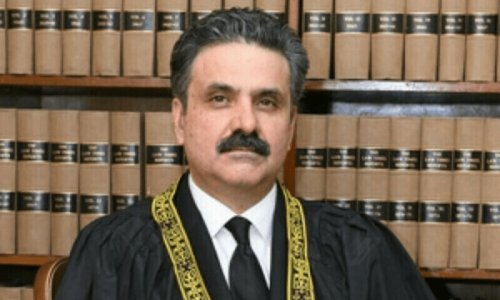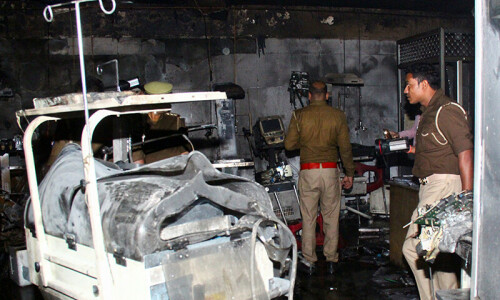ISLAMABAD: Finance Minister Ishaq Dar has said that the electricity tariff will not be increased in the near future and the government will expeditiously complete transactions to the tune of $2.4 billion, which have been put on hold because of the political crisis, and a review with the International Monetary Fund (IMF) next month.
Speaking to reporters, he said the government had no plan to make a seven per cent increase in the tariff, as required under the IMF programme.
Know more: Continuation of power subsidies will hamper growth, court told
The government has faced severe criticism from consumers over wrong billing and overcharging in recent weeks. Continuing agitation by the Pakistan Tehreek-i-Insaf and Pakistan Awami Tehreek also appears to have been fuelled by the issue, adding to the challenges faced by the government in going ahead with further tariff hikes.
Earlier, the government had agreed with the IMF to revise the electricity tariff in October as loadshedding would ease with a fall in temperatures.
The fourth review with the IMF of the $6.8 billion programme could not be completed in Dubai because the political tension in Islamabad increased on Aug 19.
As a consequence, the IMF did not hold a meeting of its executive board in the second week of this month as earlier planned, resulting in postponement of disbursement of a $550m instalment.
In the meanwhile, the launching of $850m global depository shares (GDS) of the Oil and Gas Development Company (OGDCL) and about $1bn Islamic Sukuk bonds was delayed.
Mr Dar said the IMF and the government had agreed to hold the review meetings and the fund’s executive board meeting in the third and fourth week of October.
In reply to a question, he said he did not agree with a suggestion to merge the fourth and fifth reviews of the programme. He said the government was speeding up the Sukuk, GDS and IMF instalment transactions delayed by the political disturbance in Islamabad.
He accused the PTI and PAT of acting on a conspiracy of some external forces, which had been projecting Pakistan’s default in 2014, to delay the transactions.
The minister said the government was planning to improve the foreign exchange reserves beyond $15bn to qualify for the International Bank for Reconstruction and Development’s facilities for development projects. The reserves now stand at $13.3bn.
“We have decided to proactively go ahead with these transactions. We are not going to wait for these spectacles to end which is not difficult to do with state power, but the government will not use force,” he said.
Mr Dar said the protesters were responsible for cancellation of visits of the presidents of three friendly countries, including China.
He said the government had finalised $32bn agreements for signing with China during President Xi Jinping’s visit.
He said China had signed $20bn agreements in Pakistan’s neighbourhood and major regional powers and developing nations were finalising a $100bn New Development Bank, but the political crisis threatened to deprive “us of the benefits of these developments”.
The finance minister said the government would gradually increase funding for health and education to four per cent of the GDP during its tenure, but now the provinces had a greater role in financing the sectors.
He said the government would pay Rs25,000 to each family affected by recent floods through ‘smart cards’, using the network of the income support programme, and continue funding security expenditures of the police and other law enforcement agencies as and when required by the interior ministry.
“We have excellent relations with the armed forces and will together take the Zarb-i-Azb campaign against terrorism to its conclusion with success,” Mr Dar said in reply to a question. Unlike the past, conspiracies would not succeed and the government and the military would take the country forward as a team, he said.
Published in Dawn, September 25th, 2014










































